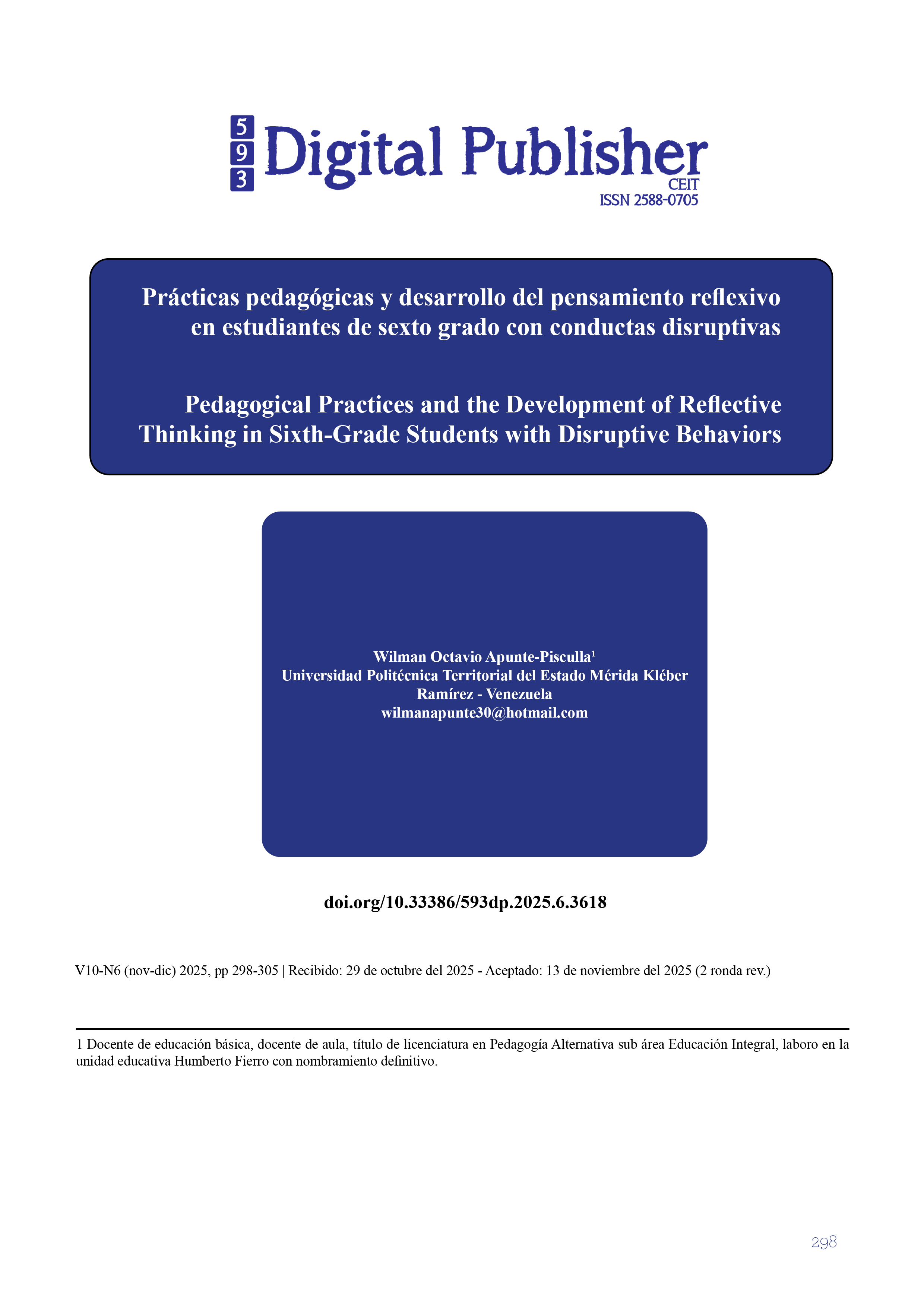Pedagogical Practices and the Development of Reflective Thinking in Sixth-Grade Students with Disruptive Behaviors
Main Article Content
Abstract
This study analyzes the impact of critical pedagogy on the development of reflective thinking and the reduction of disruptive behaviors among sixth-grade students in basic education. Using a qualitative, descriptive, and exploratory approach, observation techniques, semi-structured interviews, and document analysis were applied to understand changes in classroom dynamics following the implementation of critical pedagogical practices. The results showed a 40% decrease in disruptive behaviors, an increase in collaborative participation, and an improvement in students’ self-reflection. These findings align with the theoretical contributions of Freire and Giroux, confirming that dialogical and reflective education fosters autonomy, self-regulation, and critical consciousness. At the social level, the study demonstrates that this pedagogical approach contributes to creating more inclusive and equitable school environments. However, limitations were identified regarding teacher resistance and the lack of training resources. It is concluded that critical pedagogy constitutes an effective pathway to promote educational transformation through reflection, dialogue, and cooperation.
Downloads
Article Details

This work is licensed under a Creative Commons Attribution-NonCommercial-ShareAlike 4.0 International License.
1. Derechos de autor
Las obras que se publican en 593 Digital Publisher CEIT están sujetas a los siguientes términos:
1.1. 593 Digital Publisher CEIT, conserva los derechos patrimoniales (copyright) de las obras publicadas, favorece y permite la reutilización de las mismas bajo la licencia Licencia Creative Commons 4.0 de Reconocimiento-NoComercial-CompartirIgual 4.0, por lo cual se pueden copiar, usar, difundir, transmitir y exponer públicamente, siempre que:
1.1.a. Se cite la autoría y fuente original de su publicación (revista, editorial, URL).
1.1.b. No se usen para fines comerciales u onerosos.
1.1.c. Se mencione la existencia y especificaciones de esta licencia de uso.
References
Carrington, L. D. (2004). Pedagogía crítica y escuela rural: un llamado a nuevos.
Creswell, J. W. (2014). Investigación cualitativa: Enfoques prácticos para disertaciones y tesis. Sage Publications.
Darder, A. (2002). Teaching as an act of love: Reflections on Paulo Freire and his contributions to education. Westport: Bergin & Garvey.
Dewey, J. (1933). How We Think. Lexington, MA: D.C. Heath and Company.
Figueroa, M. (2016). La pedagogía crítica en la educación rural: Retos y oportunidades. . Latinoamericana de Educación, 22(4), 45-59.
Freire, P. (1970). Pedagogy of the Oppressed. . New York: Continuum.
Freire, P. (2005). Pedagogía del oprimido. Siglo XXI Editores.
García, M. (2018). La gestión de las conductas disruptivas en el aula: Un análisis desde la psicopedagogía. Madrid: Educativa.
Giroux, H. (2010). Pedagogy and the Politics of Hope: Theory, Culture, and Schooling. Westview Press.
Gómez, E. (2011). Pedagogía crítica en contextos rurales: Retos y perspectivas. . Barcelona: Síntesis.
González, L. (2017). El impacto de las conductas disruptivas en el aula: Un análisis desde la psicología educativa. Revista de Psicología y Educación, 35(1), 25-41.
Grant, P. D., Longhurst, J. M., & Thier, M. (2024). Rural Definition Triangulation: Improving the Credibility and Transferability of Rural Education Research. Journal of Research in Rural Education, 40(1).
López, A. &. (2019). La pedagogía crítica aplicada al manejo de conductas disruptivas en contextos de pobreza. Educación y Sociedad, 45(2), 125-140.
Martínez, M. (2015). Educación y pedagogía crítica: De la teoría a la práctica. . Universidad Pedagógica.
M Ødegård, T. (2024). Identifying teachers’ reactive strategies towards disruptive behaviour in the classroom. Teaching and Teacher Education.
Pérez, L. &. (2019). Educación reflexiva y cambio de comportamiento en la escuela primaria. . Buenos Aires: Educativas.
Vásquez, C. (2018). La pedagogía crítica como herramienta para el manejo de conductas disruptivas en el aula: Un estudio de caso en la educación primaria rural. Journal of Educational Research, 21(3), 39-52.
Vygotsky, L. S. (1998). El desarrollo de los procesos psicológicos superiores. . Akal.
What Is Qualitative Research? An Overview and Guidelines. (2024). Qualitative Research Journal.


